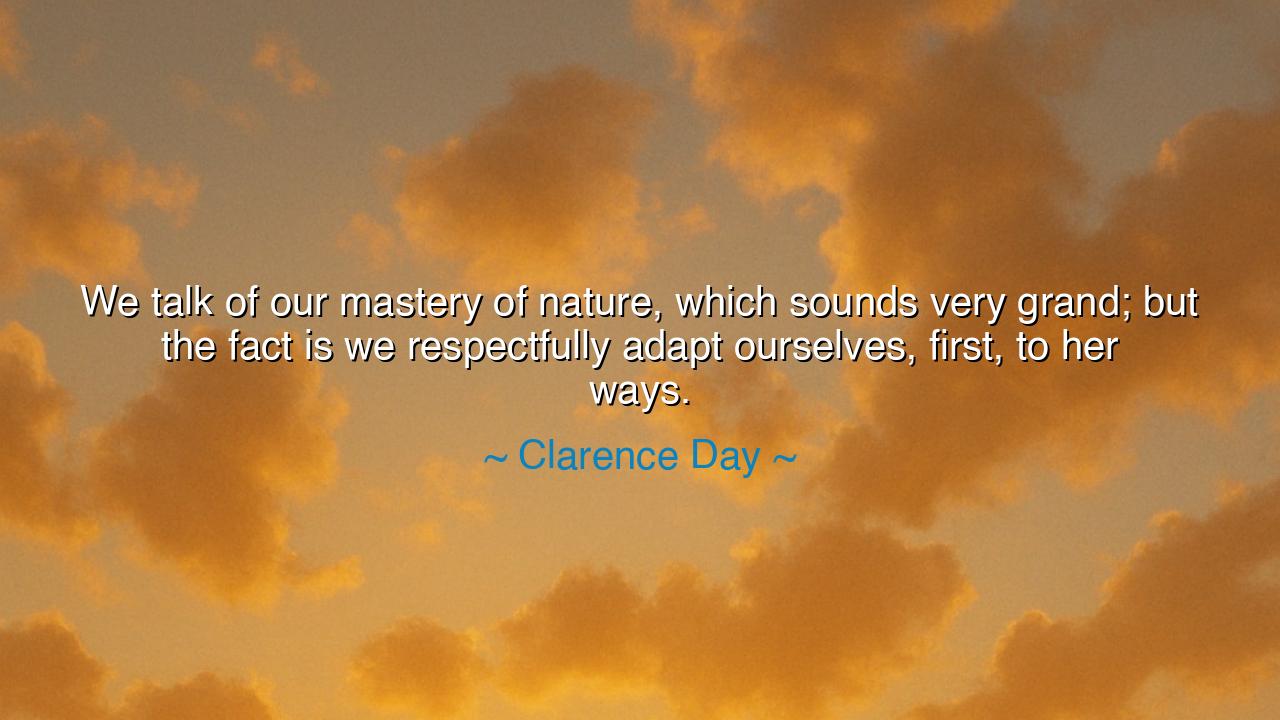
We talk of our mastery of nature, which sounds very grand; but
We talk of our mastery of nature, which sounds very grand; but the fact is we respectfully adapt ourselves, first, to her ways.






Clarence Day, with quiet wisdom, once declared: “We talk of our mastery of nature, which sounds very grand; but the fact is we respectfully adapt ourselves, first, to her ways.” In these words lies a truth as old as the mountains and as deep as the sea. Man boasts of his dominion, his conquest, his supposed rule over earth and sky. Yet beneath this pride, if he looks honestly, he will see that he is not ruler, but guest; not master, but pupil. For all his inventions and empires, he lives still under the eternal laws of nature, bending himself to her rhythms whether he admits it or not.
O listener, reflect upon this: we build ships to cross the ocean, but only by learning the ways of wind and current. We fly through the skies, but only because we first studied the flight of birds and the pressure of air. We till the soil and claim to command the harvest, but our crops still rise and fall with the sun, the rains, and the hidden mysteries of the earth. This is not conquest—it is adaptation. Day’s words remind us that true wisdom begins with humility, with the recognition that all human mastery is born of careful study and reverence for the world we did not create.
History itself bears witness. Consider the ancient Egyptians, who made their civilization flourish not by conquering the Nile, but by adapting to its cycles. They learned its floods, its silts, its seasons, and so they built calendars, irrigation, and fields of grain. Had they sought to resist the Nile, they would have perished. By respecting it, they thrived for centuries, raising monuments that stand to this day. Their greatness was not proof of their mastery over nature, but of their obedience to it.
So too with the sailors of Polynesia, who crossed vast oceans long before compasses and maps. They read the stars, the waves, the flight of seabirds, and the colors of the sea. They did not pretend to rule the waters, but they became wise in its secrets. Their journeys remind us that the earth’s forces are not to be commanded like servants but understood like teachers. Their survival was born not of arrogance, but of reverence.
Day’s reflection comes as a gentle rebuke to the pride of modern man, who boasts of bending the world to his will. But storms still strike, earthquakes still shatter cities, droughts still parch the land. No matter how high we build, nature remains beyond our grasp. Every attempt at mastery proves instead our dependence. To live well, therefore, is not to dominate, but to live in harmony, to adapt with respect and wisdom to the ways that are greater than our own.
The lesson is clear: let us cast aside pride and walk humbly upon the earth. Seek to understand nature’s laws rather than to break them. Study her patterns, respect her strength, and learn to live within her bounds. For when we adapt ourselves to her ways, we find prosperity; when we ignore them, we invite ruin. The floods, the famines, the changing climate—all these remind us that man is not lord of the earth but steward, bound to her rhythms.
Therefore, children of tomorrow, live with humility. Do not see the earth as conquered, but as a partner. Walk lightly, build wisely, and remember always that every step of progress rests upon the foundation of nature’s enduring laws. In this truth lies both strength and survival. For the highest form of mastery is not domination, but reverent adaptation.
And so remember Clarence Day’s teaching: what sounds grand may not be true, and what seems humbling may in fact be the path to greatness. To boast of mastery is vanity; to live in harmony is wisdom. Let us be not tyrants over nature, but her students—forever learning, forever grateful, forever adapting to the eternal ways of the earth.






AAdministratorAdministrator
Welcome, honored guests. Please leave a comment, we will respond soon